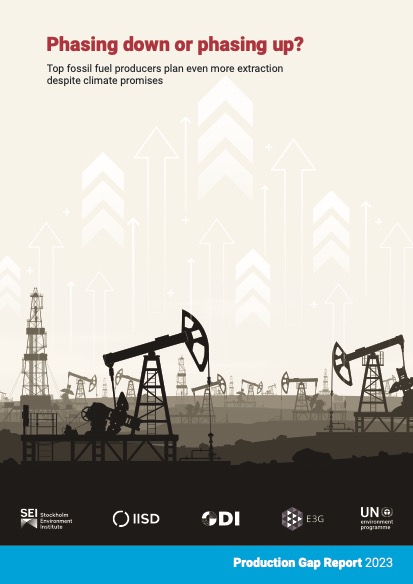
New ISO ESG Implementation Principles provide int’l guidance to streamline ESG practices
New ESG Implementation Principles launched the International Organization for Standardization (ISO) at the 29th United Nations ...

Michael Lazarus, Center Director of Stockholm Environment Institute (SEI), said “COP28 could be the pivotal moment where governments finally commit to the phase-out of all fossil fuels and acknowledge the role producers have to play in facilitating a managed and equitable transition.”
“Governments with the greatest capacities to transition away from fossil fuel production bear the greatest responsibility to do so while providing finance and support to help other countries do the same,” said Lazarus, a lead author of the “2023 Production Gap Report: “Phasing down or phasing up? Top fossil fuel producers plan even more extraction despite climate promises”.
The report – produced by Stockholm Environment Institute (SEI), Climate Analytics, E3G, International Institute for Sustainable Development (IISD) and the UN Environment Program (UNEP) – assessed governments’ planned and projected production of coal, oil, and gas against global levels consistent with the Paris Agreement’s temperature goal.
The report found out that governments plan to produce around 110% more fossil fuels in 2030 than would be consistent with limiting warming to 1.5°C, and 69% more than would be consistent with 2°C.
The report provided newly expanded country profiles for 20 major fossil-fuel-producing countries; Australia, Brazil, Canada, China, Colombia, Germany, India, Indonesia, Kazakhstan, Kuwait, Mexico, Nigeria, Norway, Qatar, the Russian Federation, Saudi Arabia, South Africa, the United Arab Emirates, the United Kingdom of Great Britain and Northern Ireland, and the United States of America. These profiles show that most of these governments continue to provide significant policy and financial support for fossil fuel production.
While 17 of the 20 countries featured have pledged to achieve net-zero emissions — and many have launched initiatives to cut emissions from fossil fuel production activities — none have committed to reduce coal, oil, and gas production in line with limiting warming to 1.5°C.
Governments, in aggregate, still plan to produce more than double the amount of fossil fuels in 2030 than would be consistent with limiting warming to 1.5°C. The persistence of the global production gap puts a well-managed and equitable energy transition at risk.
Taken together, government plans and projections would lead to an increase in global coal production until 2030, and in global oil and gas production until at least 2050. This conflicts with government commitments under the Paris Agreement, and clashes with expectations that global demand for coal, oil, and gas will peak within this decade even without new policies.
Major producer countries have pledged to achieve net-zero emissions and launched initiatives to reduce emissions from fossil fuel production, but none have committed to reduce coal, oil, and gas production in line with limiting warming to 1.5°C.
Governments should be more transparent in their plans, projections, and support for fossil fuel production and how they align with national and international climate goals.
There is a strong need for governments to adopt near- and long-term reduction targets in fossil fuel production and use to complement other climate mitigation targets and to reduce the risks of stranded assets.
Given risks and uncertainties of carbon capture and storage and carbon dioxide removal, countries should aim for a near total phase-out of coal production and use by 2040 and a combined reduction in oil and gas production and use by three-quarters by 2050 from 2020 levels, at a minimum. The potential failure of these measures to develop at scale calls for an even more rapid global phase-out of all fossil fuels.
An equitable transition away from fossil fuel production must recognize countries’ differentiated responsibilities and capabilities. Governments with greater transition capacity should aim for more ambitious reductions and help finance the transition processes in countries with limited capacities.
“Governments are literally doubling down on fossil fuel production; that spells double trouble for people and planet,” said UN Secretary-General António Guterres. “We cannot address climate catastrophe without tackling its root cause: fossil fuel dependence. COP28 must send a clear signal that the fossil fuel age is out of gas — that its end is inevitable. We need credible commitments to ramp up renewables, phase out fossil fuels, and boost energy efficiency, while ensuring a just, equitable transition.”
“Governments’ plans to expand fossil fuel production are undermining the energy transition needed to achieve net-zero emissions, throwing humanity’s future into question,” said Inger Andersen, Executive Director of UNEP. “Powering economies with clean and efficient energy is the only way to end energy poverty and bring down emissions at the same time.”
“Starting at COP28, nations must unite behind a managed and equitable phase-out of coal, oil and gas — to ease the turbulence ahead and benefit every person on this planet,” she added.
“We find that many governments are promoting fossil gas as an essential ‘transition’ fuel but with no apparent plans to transition away from it later,” says Ploy Achakulwisut, a lead author on the report and SEI scientist. “But science says we must start reducing global coal, oil, and gas production and use now — along with scaling up clean energy, reducing methane emissions from all sources, and other climate actions — to keep the 1.5°C goal alive.”
New ESG Implementation Principles launched the International Organization for Standardization (ISO) at the 29th United Nations ...
PUMA has already made strong progress in reducing its greenhouse gas emission over the past ...
The United Nations Trade and Development (UNCTAD) urged during the 29th United Nations Climate Change ...


اترك تعليقا